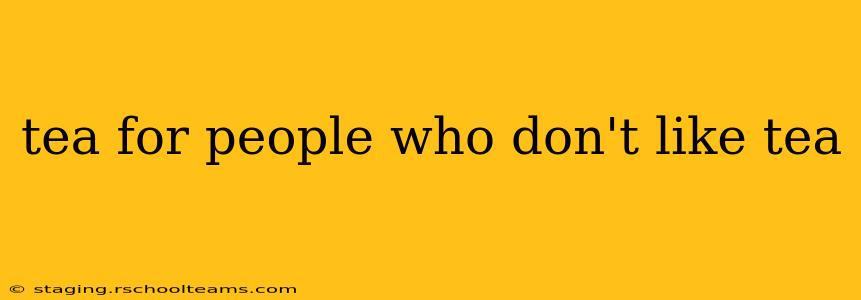Many people claim to dislike tea, often citing bitterness or a lack of sweetness. However, the vast world of tea offers far more than just the strong, bitter brews that might have soured their experience. This guide explores delicious tea options perfect for those who think they don't like tea, highlighting the nuances that make each variety unique and enjoyable. We'll dispel common misconceptions and help you discover a tea you'll actually love.
What Makes People Dislike Tea?
Before diving into palatable tea options, let's address the root causes of tea aversion. Common complaints include:
- Bitterness: Over-steeped or low-quality black teas are frequent culprits. The bitterness comes from tannins, naturally occurring compounds in tea leaves.
- Strong Flavor: Some find the robust, earthy flavors of traditional teas overwhelming.
- Lack of Sweetness: Many prefer sweeter beverages and may find plain tea too austere.
Understanding these issues is crucial to finding the right tea. The good news is that these problems are easily mitigated with the right choices.
What Types of Tea Are Good for Tea Beginners?
Let's explore tea types that often appeal to those who initially disliked tea:
Herbal Infusions (Tisanes): Are These Really Tea?
Technically, herbal infusions aren't "tea" as they don't come from the Camellia sinensis plant. However, they are often categorized alongside tea and offer a gentle introduction to the world of warm beverages. These infusions are caffeine-free and boast a wide variety of flavors:
- Chamomile: Known for its calming properties and slightly sweet, floral aroma.
- Peppermint: Refreshing and invigorating with a clean, minty flavor.
- Fruit Infusions: Often blended with other herbs and spices, these offer fruity and sweet profiles. Think strawberry, raspberry, or hibiscus.
- Rooibos: This South African herbal tea is naturally sweet and slightly nutty, often enjoyed iced or hot.
These options provide a gateway to enjoying warm drinks without the intensity of traditional teas.
White Tea: The Mildest of Teas
White tea is minimally processed, resulting in a delicate, subtle flavor profile. It's less bitter than black tea and has a slightly sweet, floral aroma. Its low caffeine content makes it a perfect choice for those sensitive to stimulants.
Green Tea: A Refreshing Alternative
Green tea boasts a wide range of flavors, from grassy and vegetal to subtly sweet and nutty. Choose a lighter, less processed variety to avoid strong bitterness. Many green teas pair well with a squeeze of lemon or a touch of honey.
How to Prepare Tea to Minimize Bitterness
The brewing method significantly impacts tea's taste. Follow these tips for a more enjoyable experience:
- Use filtered water: Water quality affects the taste.
- Don't over-steep: Steep for the recommended time; over-steeping intensifies bitterness.
- Use the right water temperature: Different teas require different water temperatures. Too hot water can make tea bitter.
- Experiment with additions: A touch of milk, honey, lemon, or even a splash of fruit juice can greatly enhance the flavor and mask any bitterness.
What About Flavored Teas?
Flavored teas offer a world of possibilities. Fruit, spice, and floral infusions can transform even the most robust teas into palatable treats. Look for teas flavored with natural ingredients for the best taste and quality.
Is Iced Tea an Option?
Iced tea is a refreshing alternative, especially during warmer months. Brewing strong tea and chilling it can mask some of the bitterness. Consider adding fruit slices or sweeteners for extra flavor.
Is There a Tea That Tastes Like [Specific Beverage]?
This is a frequently asked question, and the answer depends on the beverage. Many flavored teas aim to mimic the taste of other drinks, such as fruit juices or even chocolate. Experimenting is key to finding your match.
Is Tea Good for My Health?
Many teas, especially green and white teas, are rich in antioxidants and offer various health benefits. However, always consult your doctor before making any significant dietary changes, especially if you have underlying health conditions.
In conclusion, the perception that "I don't like tea" is often based on limited exposure to the diverse world of tea types and brewing methods. By understanding the reasons behind tea aversion and exploring the gentler options, anyone can find a tea they enjoy. So, ditch the preconceived notions and embark on a tea-tasting adventure—you might be surprised at what you discover!
